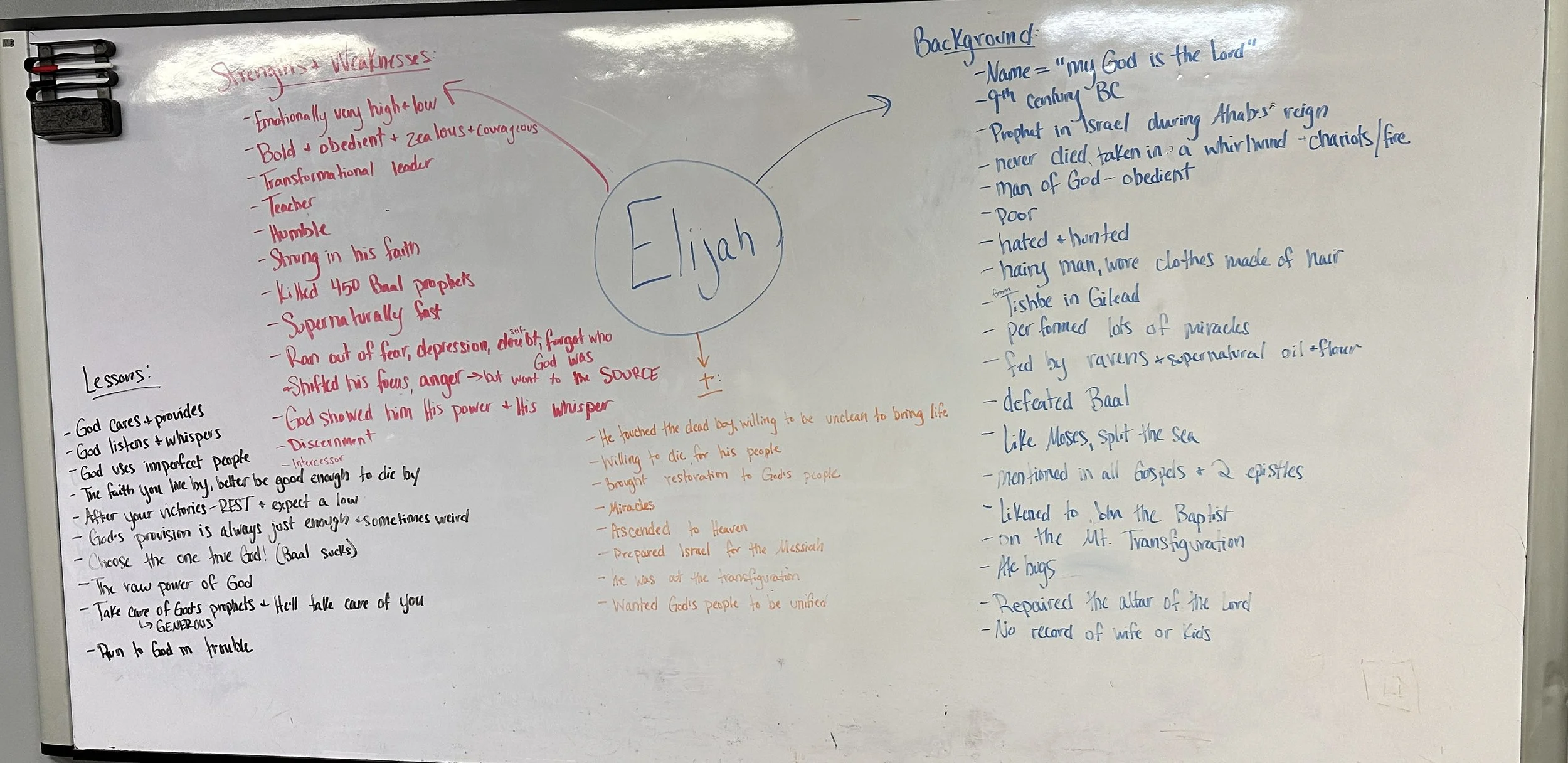THE LETTER OF James
How can we be faithful friends of God like Abraham? Can we resist the pressures of the world, our rebellious human impulses, and the influence of the devil? Can Christians live together in peace as we seek solutions to life’s problems?
James addresses these issues in his letter as he seeks to motivate Christians to develop a mature and consistent faith and to show how Christians can have loyal friendship with God and with one another.
SETTING James, Jesus’ brother, writes as the leader of the Jerusalem church to Jewish Christians who have been scattered by persecution. He encourages them to endure their trials with Christian fortitude and to exhibit consistent Christian character. The recipients of this letter were Jewish Christians (1:1; 2:1) who had been scattered by the persecutions which began with the stoning of Stephen (Acts 8:1; 11:19). They lived among the Jews who had been “scattered abroad” in the Diaspora (1:1; John 7:35), which had its origins in the Assyrian dispersion of Israel (the northern kingdom) in 722–721 bc and in the Babylonian exile of Judah (the southern kingdom) in 586 bc. This dispersion later included many Jews who traveled extensively during the Greek and Roman empires (4:13; Acts 13:14; 17:1). By the middle of the first century, there were Jewish communities all over the Greco-Roman world. The Setting of James, about ad 46. James, one of Jesus’ brothers, was a leader of the church in Jerusalem. The believers from Jerusalem had been scattered in the early 40s ad as a result of persecution (see Acts 8:1–3; 12:1–4). The scattered believers traveled throughout Judea, Samaria, and Phoenicia, and to Antioch in Syria and Cyprus (see Acts 11:19).
SUMMARY The letter of James is written with a pastor’s perspective, and it focuses more on ethics than any other book of the NT. The letter contains teachings based on the law as understood through the life and teaching of Jesus (1:25; 2:8). James also reflects Jesus’ own teachings, especially as later recorded in Matthew’s “Sermon on the Mount” (Matt 5–7) and Luke’s “Sermon on the Plain” (Luke 6:20–49).
AUTHORSHIP The letter of James was written by one of Jesus’ brothers (see further “James, the Brother of Jesus” at Acts 15:13–21, p. 1858). Like the other sons of Joseph and Mary (Matt 13:55), James (Greek Iakōbos) bore the name of an Israelite hero: Jacob (Hebrew Yaʿaqob; Greek Iakōb). After Jesus’ resurrection, James became a believer (cp. 1 Cor 15:7) and rose to a position of leadership in the Jerusalem church (see Acts 15:13–22). During Jesus’ public ministry, neither James nor the other siblings were followers of Jesus. They had even tried to end his ministry and bring him home to his responsibilities as eldest son (Mark 3:31–35; cp. John 7:3–5).
A personal resurrection appearance convinced James that Jesus was the Christ (1 Cor 15:7), and he was with the others in the upper room when the Spirit was given on Pentecost (Acts 1:14; 2:1–3). James became the leader of the Jerusalem church after Peter’s arrest and departure from Jerusalem (Acts 12:1–3; 15:13–21; 21:18; Gal 1:19; 2:9).
DATE AND LOCATION OF WRITING The letter of James is one of the earliest books in the NT, written after the persecution under Herod Agrippa (ad 44, Acts 12:1–5), yet prior to Galatians (ad 48~49) and the council in Jerusalem (ad 49~50). It reflects an early period prior to the conflict over circumcising Gentile converts and before the development of false teachings in other Christian communities. It was a time when synagogue (”meeting,” 2:2) and church (5:14) were interchangeable terms, as were law and word (1:23, 25). That this letter was written from Jerusalem is deduced from information in Acts and Galatians about James’s location (Acts 15:13–22; 21:18; Gal 1:18–19; 2:9, 12). The book contains allusions appropriate to Palestine, including references to the scorching heat (1:11); salty water springs (3:11); the cultivation of figs, olives, and grapevines (3:12); the imagery of the sea (1:6; 3:4); and the early and later rains (5:7).
LITERARY CHARACTER The letter of James is written in good Koiné Greek, the common Greek of the Greco-Roman world. It reflects the Hellenistic influences on Galilee and Palestine, as well as the enculturation of Jewish readers in the Diaspora. James writes with grammatical accuracy, has a wide vocabulary, and has an elegant feel for the rhythms and sounds of words. There are clear allusions to the Greek translation of the OT (e.g., 4:6), with some imagery from the Hellenistic world. James distinctively emphasizes friendship as the ideal relationship with God.
James is closer in style to the Book of Provers than it is to any NT book. It uses questions to introduce new topics, there are frequent commands (over half of the verses in James are imperatives!), and it proves points by quotes and examples. This diversity may be evidence that James ia collection of short sermons on different topics. Although Jesus is seldom referred to or quoted, his teaching on the Sermon on the Mount underlies much of this letter.
MEANING AND MESSAGE James’s primary concern is for his readers to maintain undivided faith and loyalty toward God (1:6). They were under pressure from a society that oppressed them economically (2:6) and abused them for their faith in Jesus Christ (2:7). James recommends patient endurance (1:3), submission to God (4:7), and sharing in the ministries of the church (5:13–20). These will result in perfection (1:4), honor (4:10), and a glorious life (1:12) at the coming of Jesus Christ (5:8). [James] takes us … back to the infancy of the Christian Church, to the purple dawn of Christian enthusiasm and the first glow of Christian love. As leader of the Jerusalem church, James maintained proper respect for the law of Moses and for Jewish traditions, such as the purification ceremonies after a vow (Acts 21:18–25). James also expressed a sympathetic understanding of the Gentile mission when he concluded that Gentiles could be recognized as Christians without first becoming proselytes to Judaism. He based this on God’s covenant with Noah (Acts 15:19–22; see Gen 9:1–17). In his letter, we find James both upholding the law (1:25) and at the same time hinting at its reinterpretation through Jesus the Messiah (2:8–11). Jewishness. This is one of the most Jewish letters in the NT. James uses the symbols of Judaism with little criticism (contrast Matt 5:21–22) and uses the primary identity markers of Judaism without redefinition (contrast Rom 2:29). James addresses the readers as the “twelve tribes” (1:1) and identifies their church gathering as a synagogue (2:2) with its elders (5:14) and teachers (3:1). He refers to the law of Moses repeatedly (1:25; 2:8–12; 4:11), cites the foundational creed of Israel (the Shema, 2:19), and names God as “the Lord of Heaven’s Armies” (5:4), a common OT title for God. James also uses the literary elements of OT wisdom literature (1:5; 3:13, 17) and prophetic exhortations (4:13; 5:1). He appeals to Israel’s heroes (Abraham, 2:21, 23; Rahab, 2:25; Job, 5:11; Elijah, 5:17). He does not, however, explicitly mention the ceremonial elements of Judaism, such as the Sabbath, circumcision, or food laws.
The apparent differences between James and Paul regarding “good works” must be understood in their differing historical and theological contexts. Paul emphasized that people could not get right with God by “obeying the law” (Rom 3:20, 28; Gal 2:16) or, indeed by anything that they might do (Rom 4:3–5). Only God, through his initiative of grace, could overcome the problem of human sin; a person must respond to him by faith. Both Paul and James believed this, but they differed in their emphasis. Paul emphasized that works of the law do not produce salvation (Eph 2:8–9), and so he opposed circumcision of Gentiles (Rom 4:5; Gal 2:11–12; 5:2–6). James, however, was addressing Jewish Christian communities. He speaks of “good works” as charitable deeds (2:14–18, 21–24). Good deeds are faithful obedience; they are the evidence of a genuine relationship with God based on faith. True biblical faith will always produce good deeds pleasing to God. James emphasizes that faith cannot be reduced to a mere affirmation of truth (2:19), and faithfulness does not allow for divided allegiance between God and the world (1:8; 4:4, 7). The letter of James gives us insight into very early communities of Christian Jews. It also helps us understand how Christians should live when they are a minority group in the midst of an oppressive, non-Christian society. It is alive with godly counsel for us today.
OUTLINE 1:1 Greetings from James 1:2–18 Faith and Endurance 1:19–27 Listening and Doing 2:1–26 Poverty and Generosity 3:1–4:3 Speech and Conflict 4:4–10 Drawing Close to God 4:11–5:6 Warnings 5:7–20 Final Exhortations TIMELINE Passover, ad 30 or 33 Jesus’ crucifixion and resurrection Pentecost, ad 30 or 33 The birth of the church in Jerusalem ad 34~35 Saul’s conversion near Damascus ad 41~44 Persecution of Christians by Herod Agrippa I ad 44~49 James writes to the “twelve tribes” ad 47~48 Barnabas and Paul’s first missionary journey ad 49~50 The council in Jerusalem early 60s ad James, the brother of Jesus, is stoned to death in Jerusalem about ad 64~65? Paul is martyred in Rome ad 70 Jerusalem and the Temple are destroyed
STUDY
Leaf through the book of James. Note captions and other clues about the book’s meaning.
As a group make a list: what are the main issues in this book? What do you think we’ll learn?What are your first impressions? What are the key ideas?
Looking at the issues that James addresses, which one strikes you as an area in which you would like to grow? Why?
How do you expect this letter to challenge you the most?
Some groups evaluate a person’s spiritual maturity by what that person believes while others do so by what that person does. What is the value and limits of each approach? Which do you tend to use? How do you feel about using the latter approach as a way to evaluate your life during the group study of James?
To get the most out of James, what will you put into it? How will you apply yourself to the group disciplines (of study, prayer, shared leadership, outreach, confidentiality, accountability, etc)?
5 WEEK PLAN: One chapter a week! This week, James 1.
Read James 1:1-18 / Trials and Tempations / and consider the following:
How does James view hardships? How do you view them?
How is “wisdom” needed in those times? What are the conditions for receiving wisdom? Why?
What would a person in humble circumstances have to take pride in? What is “low” about a rich person position?
What is the practical different between trials and tempations? How would you illustrate the process in verses 14-15? How is this related to the gifts from God?
Read James 1:19-27 / Listening and Doing / and consider the following:
Illustrate what it means to be “quick to listen”. How does this produce the “righteous life that God desires”?
What is the point of the mirror image? How is this point reflected in worthless or pure religion?
Think of one significant relationship you have. What would change if you had applied verses 19-20 with that person this week?
What aspect of God’s Word here will you put into action this week?





















































